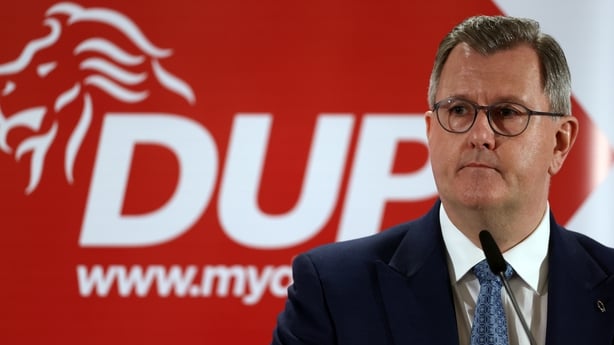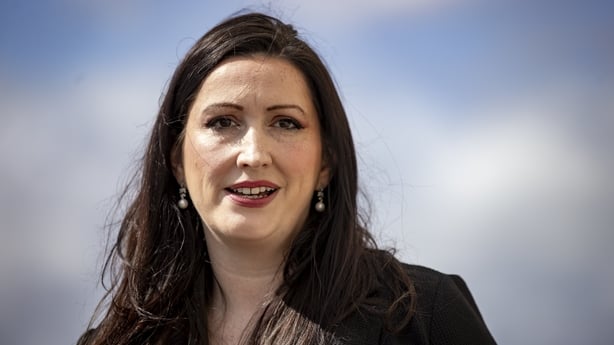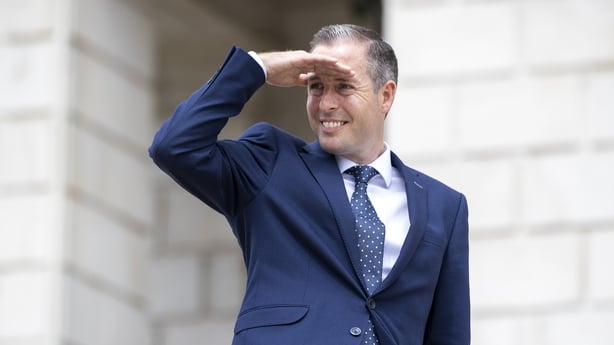The upcoming UK general election is one full of potential jeopardy for the DUP.
The party could lose its leader and see itself once again eclipsed by Sinn Féin.
There are 18 Westminster constituencies in Northern Ireland and the DUP is the largest party with eight MPs, just one ahead of Sinn Féin on seven.
Sinn Féin has broken the mould and records in successive elections and is now the largest party in local government as well as the Stormont Assembly; winning the most seats in the general election would be a remarkable hattrick.
There are many pitfalls for the DUP.
Gavin Robinson was dramatically parachuted in as leader on 29 March when Jeffrey Donaldson stood down after being charged with rape and ten other historical sexual offences, which he denies.
That arrest and the pending court case will cast a shadow over the DUP's election campaign, with party strategists and candidates concerned about how its traditional support base, which includes many deeply conservative Christians, might react.
However, that is just one of many concerns.
The Traditional Unionist Voice (TUV) has linked up with Reform UK and has indicated that it will field candidates against the DUP in protest at its decision to return to power-sharing.
Gavin Robinson himself faces a tough fight to retain his Westminster seat in East Belfast.
In the last UK general election in 2019 his winning margin over Alliance Party leader Naomi Long was just over 1,800 votes.
If Ms Long decides to run this time around, he could be in real trouble.
The Alliance Party is on an upward trajectory, winning a record 17 seats in the last Assembly elections. Add to that the opposition from many unionists and loyalists to the DUP decision to re-enter power-sharing and Mr Robinson's position looks very precarious.

Defeat would plunge the DUP into crisis as it would seriously undermine Mr Robinson's position as leader, potentially forcing him to step down and plunge the party into a leadership contest.
In a statement responding to Rishi Sunak's declaration of a general election on 4 July, Gavin Robinson struck a bullish tone, stating that it would provide the people with a clear choice as to who they think is best placed to represent them and "deliver the best outcomes".
Mr Robinson went on to say that the next government will have to do much more to ensure Northern Ireland "benefits as an integral part of the United Kingdom rather than remaining subject to European laws in some areas of our daily lives".
Those words will be seized upon by the party's unionist and loyalist critics, who consistently accuse the DUP of misleading people by claiming the deal it struck to return to power-sharing removed the so-called Irish Sea Border.
If what they have labelled "The Donaldson Deal" was so good, then why is Northern Ireland still subject to European laws?

The reality is the date for the election is not one the DUP would likely have favoured.
4 July is just a week before the height of the loyalist marching season, a time when political tensions in Northern Ireland traditionally increase and unionist rhetoric becomes more entrenched.
The last thing the DUP needs is for the thousands of band parades that will take place across Northern Ireland in preparation for the twelfth to become rallying points for those opposed to its deal to restore power-sharing.
Mr Robinson's seat isn't the only concern for his party.
A solicitor for Jeffrey Donaldson confirmed yesterday that he will not be seeking re-election in this general election, saying he wants to concentrate on defending the charges against him.
The former DUP leader is Northern Ireland's longest serving MP, having represented Lagan Valley for 27 years.
Last time around, in 2019, he romped home with a vote of 19,586, a majority of 6,499 over Sorcha Eastwood of the Alliance Party, a hugely ambitious politician whose profile has soared in the five years since that vote.
Much of the success was the result of a personal vote that may not carry over to his replacement and at this stage the DUP can't even decide who that will be.

One option is Emma Little-Pengelly, Stormont's Deputy First Minister. Recent opinion polls suggest she is popular, but there is resentment in some sections of the DUP at the fact that she was parachuted into Lagan Valley as an Assembly member, being co-opted rather than being elected.
She also lost the last Westminster election she contested, beaten by the SDLP's Claire Hanna in South Belfast.
It's not yet clear if she wants to enter the general election fray or remain at Stormont.
Read more: UK party leaders kick off election campaigns
Another name in the frame is Paul Givan, the current Education Minister at Stormont and former First Minister, whose resignation triggered a two-year DUP boycott.
Both potential DUP candidates may be wary of the combined danger of the threat posed by the Alliance Party, a backlash from potential party voters because of the circumstances of Jeffrey Donaldson's demise, and a campaign by unionists opposed to its return to power-sharing.

Then there's South Antrim, where the DUP's Paul Girvan won in 2019 with a majority of just under 2,700 votes ahead of an Ulster Unionist challenger.
His Ulster Unionist challenger this time around will be Robin Swann, who clearly smells blood as he has switched constituency.
As health minister during the Covid pandemic, his personal popularity ratings were higher than any other politician in Northern Ireland.
Reappointed health minister when the Stormont Executive was restored, he has said he will step down from the role to campaign for Westminster, but he'll hope those popularity ratings will translate into votes.
So on a bad day for the DUP, it could lose seats in East Belfast, Lagan Valley and South Antrim, reducing its total to five.
Sinn Féin will go into the election confident it can retain its seven seats, and will focus huge efforts on trying to regain Foyle from Colum Eastwood. But it faces a huge task, with the SDLP leader winning with a huge majority of more than 17,000.
The Alliance Party will target gains in East Belfast and Lagan Valley, but it also faces potential jeopardy.
The party's deputy leader Stephen Farry won North Down with a majority of 2,968 over Alex Easton of the DUP.
This time around, on Independence Day, Mr Easton is standing as an Independent and is targeting votes from the Ulster Unionists as well as his former party.
Summer holiday plans are being cancelled and manifestoes drawn up for the battle ahead.
Just two months into the job, Gavin Robinson is by a distance Northern Ireland's shortest serving party leader, and the one with most to lose.







